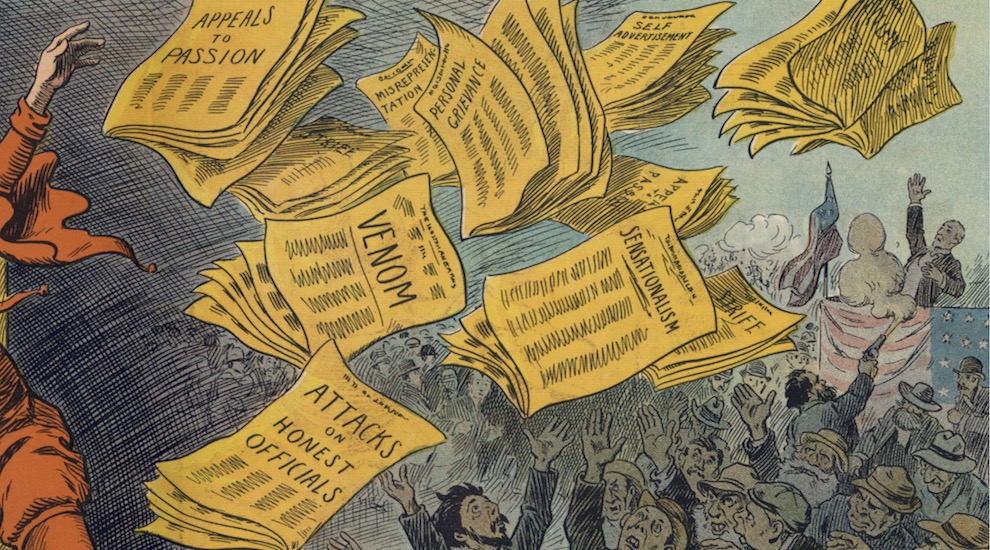
The growing stream of reporting on and data about fake news, misinformation, partisan content, and news literacy is hard to keep up with. This weekly roundup offers the highlights of what you might have missed.
What we know about Russian interference in the 2016 election: Social media. The New York Times published a big interactive feature on everything we know so far about how the Russians interfered in the 2016 U.S. presidential election. There’s a good section on what they did on social media that serves as a handy summary:
When Facebook first acknowledged last year the Russian intrusion on its platform, it seemed modest in scale. The $100,000 spent on ads was a trivial sum compared with the tens of millions spent on Facebook by both the Trump and Clinton campaigns.
But it quickly became clear that the Russians had used a different model for their influence campaign: posting inflammatory messages and relying on free, viral spread. Even by the vertiginous standards of social media, the reach of their effort was impressive: 2,700 fake Facebook accounts, 80,000 posts, many of them elaborate images with catchy slogans, and an eventual audience of 126 million Americans on Facebook alone. That was not far short of the 137 million people who would vote in the 2016 presidential election.
And Facebook was only the biggest of the engines powering the Russian messages.
On Instagram, there were 170 ersatz Russian accounts that posted 120,000 times and reached about 20 million people. Twitter reported that in the 10 weeks before the election some 3,814 Internet Research Agency accounts interacted with 1.4 million people — and that another 50,258 automated “bot” accounts that the company judged to be Russia-linked tweeted about the election. The trolls created at least two podcasts, posted Vine videos, blogged on Tumblr, sought donations via PayPal and even exploited the Pokémon Go craze.
As I’ve been saying, when the platforms try to address disinformation, they will be accused of political bias by people/entities who benefit from this disinformation. They will have to find a way to resist being manipulated by those accusations.
— Kate Starbird (@katestarbird) September 23, 2018
“Clear marking systems and rules for bots.” Twitter, Facebook, and Google, among other companies, signed on to the European Commission’s “Code of Practice on Disinformation” The code isn’t legally binding or anything, so take it for what it is, but a few interesting bits of things the companies are saying they’ll do:
Facebook, Google, and Twitter committed to supporting good faith independent efforts to track disinformation and understand its impact—and *to not prohibit or discourage good faith research*.
(Relevant to https://t.co/Q1u80CqUoZ) pic.twitter.com/zab0FokLZG
— Aviv Ovadya (@metaviv) September 27, 2018
1) Signatories including Facebook, Google, and Twitter commit to bot detection and identification by promising to "establish clear marking systems and rules for bots to ensure their activities cannot be confused with human interactions". This is important! 2/6
— Rasmus Kleis Nielsen (@rasmus_kleis) September 26, 2018
The EC’s sounding board for the code noted that it’ll be important to actually measure whether the companies are able to do what they say they’re going to do: “While it will be very difficult to assess the overall development of online disinformation, a test case around the European elections could be elaborated. Based on the work of independent factcheckers and academic researchers, regular evaluation of the situation could be carried out.”
It isn’t enough, writes Natasha Lomas for TechCrunch: “If platforms agreeing not to actively impede good faith research in this area is your bar for progress, it’s hard [not] to conclude that it’s being set disturbingly low.”
Also, on Thursday and Friday, European Parliament is hosting “Fact Checking in the EU,” an event in Brussels that you can follow on Twitter here.
“We can say with certainty that the killings happened here.” BBC Africa investigated the murder of two women and two children, closely analyzing video to determine the time and place of the murders and the identity of the killers — Cameroonian soldiers. (Cameroonian government officials had previously dismissed the video as “fake news.”)
Putting all this evidence together, we can say with certainty that the killings happened herehttps://t.co/ION682W82n pic.twitter.com/kF0CM0KHbr
— BBC News Africa (@BBCAfrica) September 24, 2018
The government’s July statement claimed that the guns seen in the video are not those used by Cameroonian troops.
But this is a Serbian-made Zastava M21. It’s rare in sub-Saharan Africa, but it *is* used by some divisions of the Cameroonian army. pic.twitter.com/vZ6xdwpC5O
— BBC News Africa (@BBCAfrica) September 24, 2018
The government’s July statement claimed that the guns seen in the video are not those used by Cameroonian troops.
But this is a Serbian-made Zastava M21. It’s rare in sub-Saharan Africa, but it *is* used by some divisions of the Cameroonian army. pic.twitter.com/vZ6xdwpC5O
— BBC News Africa (@BBCAfrica) September 24, 2018
Poynter’s Daniel Funke has more on how the BBC did it.
Cameroon’s government has not responded to the BBC’s investigation, reported Mbom Sixtus for Quartz.